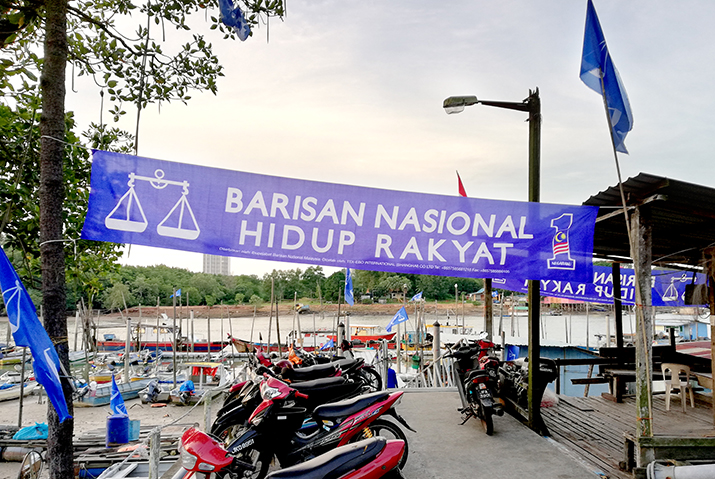The political dramas gripping Kuala Lumpur in the past week have not reverberated down south in Johor. With relative ease, Barisan Nasional has taken control of the state assembly


Serina Rahman
5 March 2020
As Malaysia’s political ructions rocked the capital last week, Johor’s political landscape was quietly but quickly transformed. With Parti Pribumi Bersatu Malaysia’s (PPBM) withdrawal from Pakatan Harapan (PH) at the federal level, Johor’s Barisan Nasional (BN) representatives seized the opportunity to establish a new state government with cross-overs from PPBM. Hasni Mohammad, Johor United Malays National Organisation (UMNO) Chairman and Benut assemblyman, was duly sworn in as Johor’s Chief Minister (CM) on Friday.
Johor’s return to BN should not be a surprise. After all, Johor has all the ingredients necessary for a smooth and undisputed return to BN rule. Johor’s Sultan Ibrahim Iskandar has often spoken of UMNO’s origins on palace grounds. Since UMNO’s formation, national elections have routinely bagged a BN majority at both the parliamentary and state levels. Prior to the general elections in 2018 (GE14), Khalid Nordin, the then-Chief Minister was very popular and the state government’s approval ratings were high. The Pakatan wave that swept the nation in the general elections of 2018 enabled the coalition to secure 39 of 56 state seats in Johor. But this had little to do with BN’s governance of the country’s third-biggest state in terms of GDP. For many voters then, their tilt towards PH was a protest vote against former premier Najib Razak, not an indication of dissatisfaction with the BN government.
Not long after GE14, my on-going documentation of grassroots views in the state revealed rumblings of dissatisfaction across the electorate. There was broad dissatisfaction with the newly-appointed CM, Osman Sapian, and complaints of a lackadaisical, disorganised and inexperienced PH government. In rural areas, PH-appointed village heads were not well-received, and at times heckled. The state of affairs was exacerbated by their lack of understanding about the intricacies of how to access funds and amenities for their localities. While the Johor Civil Service (JCS) is known to run like clockwork no matter who holds the reins of power, the state had prior to GE14 never had a government without BN. This resulted in some initial resistance, confusion and lethargy in the JCS.
As the months passed, Johor citizens increasingly expressed regret about their choice in GE14. Their unhappiness stemmed from stagnant (but high) costs of living; unfulfilled or retracted promises; and increased restrictions and “difficulties” imposed on the people as the new government tried to improve processes, transparency and security. In rural areas, especially, people felt the pain of the Sales and Services Tax and the freezing of BR1M, a federal government income support scheme.
When news of the tumultuous events of 23 February broke, rural Johor rejoiced in the belief that governance would return to a Malay-dominated coalition that had their interests at heart. A new UMNO-PPBM-PAS-MIC coalition claimed to have a simple majority, and Sultan Ibrahim met with 54 Johor assemblymen to determine their position. Twenty-eight were in support of the new coalition while 26 remained with PH. Two of them – Salahuddin Ayub of Amanah and Mazlan Bujang of PPBM – were not available at the time. A palace statement soon after the meetings bestowed approval to the new coalition to present their nominee for Chief Minister. In spite of protests of a hung assembly (PH had argued that there were exactly 28 representatives on each side), the CM nominee was swiftly accepted by Sultan Ibrahim.
By Friday, not only had Johor returned to UMNO-PPBM rule under a new Chief Minister, but Johor’s football team, JDT, avidly supported by Johoreans of all strata and ethnicities, won their first match at a new stadium. Already buoyed by these developments, the state woke up on Sunday to news that former Johor CM and Pagoh Member of Parliament, Muhyiddin Yassin, was Malaysia’s 8th Prime Minister. Former BN local representatives immediately began pressuring PH village heads to clear their offices for their return. The sentiment on the ground is that Johor is once again on the rise.
Should Muhyiddin cease to be PM following a no-confidence vote at the next parliamentary sitting, Johor’s state government will most likely continue to pootle along unperturbed under UMNO-PPBM rule
There appears to be a contrast of approaches between Muhyiddin and Hasni when it comes to the important issue of race. Muhyiddin is widely remembered for his 2010 declaration that he is “a Malay first”, but that “being a Malay does not mean that you are not a Malaysian”. His recent decision to helm a Malay-dominated coalition provides a further indication of his political leanings. Hasni heads a Malay nationalist party, but has since declared that he is “Bangsa Johor” and that he will appoint an executive council (exco) that reflects the state’s multi-ethnic composition by Friday (March 6). A concept coined by Johor royal family, Bangsa Johor refers to the practice of “one Johor, one people”, regardless of race or religion.
Should Muhyiddin cease to be PM following a no-confidence vote at the next parliamentary sitting, Johor’s state government will most likely continue to pootle along unperturbed under UMNO-PPBM rule. Traditionally, the state is famed for its efficient functioning, quite independent of federal machinations. Moreover, the BN-led state assembly has the support of the palace, the broad acceptance of its people, and will by next Friday have a state exco ruling under the aegis of “Bangsa Johor”. As such, the state should be able to glide on relatively smoothly, regardless of the political turbulence at the federal level.
CM Hasni is also well-placed to take the state forward. He hails from Pontian and boasts of past experience as a state exco member. He was the political secretary to Hishamuddin Hussein and the head of State Public Works, Rural and Regional Development under Khalid Nordin. In addition, the alacrity with which he was accepted by the Sultan indicates that he has what it takes to successfully manage his position and relationships in the Johor political scene. It remains to be seen how the two Johor protagonists move forward – Muhyiddin in his tenuous position as PM, and Hasni with his plan to reinvigorate Johor and manage the relationship with neighbouring Singapore. Keeping a close eye on the trajectories of the two political personalities will provide a good sense of where the country is headed.
Serina Abdul Rahman is a Visiting Fellow at the ISEAS – Yusof Ishak Institute
ISEAS Commentary – 2020/24
The facts and views expressed are solely that of the author/authors and do not necessarily reflect that of ISEAS – Yusof Ishak Institute. No part of this publication may be reproduced in any form without permission.


